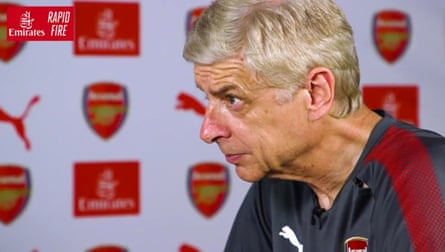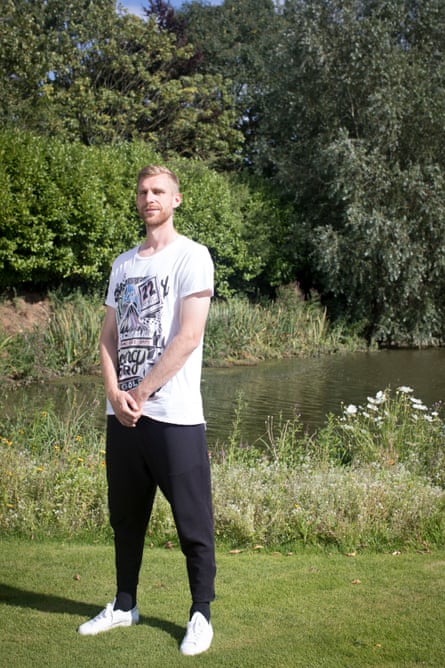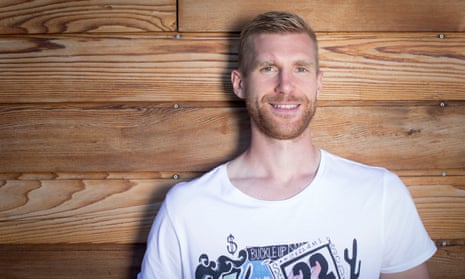Conversation flows in Per Mertesacker’s company. Gregarious, candid and good fun, the German has talked for more than an hour, discussing everything from Brexit and Angela Merkel to Martin Keown and Phil Collins. He has explained why he prefers a handshake rather than a selfie on the tube, the thinking behind singing Drake lyrics in the Arsenal dressing room and, with one eye on his future role as the club’s academy manager, revealed how he wants to help the youngsters that are rejected, not just those that make it. Yet the only place to start is with Spike, his pet guinea pig.
For those yet to see the footage that emerged on social media last week, it is worth finding a few minutes to watch Mertesacker and Wenger firing questions at one another across a table. Zorro, Anna Kournikova and Bob Marley all get a mention, but the moment of comedy comes when the Arsenal manager asks his 6ft 6in centre-half to identify his favourite pet animal. “Guinea pig,” replies Mertesacker. Wenger’s reaction is priceless. “What?” says the Arsenal manager, narrowing his eyes and looking flabbergasted. Almost apologetically, Mertesacker repeats his answer, even though Wenger had clearly heard the first time.
Mertesacker, despite encouragement from his friends, has never looked at the video, preferring to “just keep the memories that I have”, but he throws his head back with laughter when told of the wider reaction. “People would have expected me to say maybe a cat or a dog or something like that,” he says. “But when I was young we didn’t have any cats or dogs. We had a guinea pig. I remember his name was Spike and he died at some stage. So it was a totally natural answer.”

Wenger and Mertesacker have had plenty of one-on-one exchanges over the years, albeit in rather different circumstances. There is huge mutual respect between manager and captain even when their discussions are tricky, as was the case two weeks before this year’s FA Cup final. Still waiting to make his first appearance of the season after coming back from a knee injury, Mertesacker felt the need to politely make a point to Wenger. “I said: ‘It doesn’t matter how bad or how good I train, I get no chance to be selected.’ He said: ‘Yes, it’s tough. But there will always be a chance. And you have to be ready.’”
Wenger was right. Six days before the FA Cup final and in the last league match of the season, Laurent Koscielny was sent off and Gabriel taken off on a stretcher. With Shkodran Mustafi also sidelined because of concussion, Arsenal were suddenly without three central defenders. It was a freakish chain of events that meant Mertesacker, who had not started a game for 13 months, was in the frame for the club’s biggest match of the season.
“One day before the game the manager names 11 players, you have to get a bib and sometimes you look at the colour and think that means something,” Mertesacker says. “On that Friday, by the time he got to me he’d called a few names, people like Rob Holding, so I knew I was playing in the final. I thought: ‘Yeah, he’s really doing it.’”
What followed was fairytale stuff as Mertesacker, playing in a three-man defence for the first time in his career, produced an outstanding performance to help Arsenal defeat Chelsea, the Premier League champions. “This game turned so many things around,” Mertesacker says. “It’s just crazy from my point of view. People saying: ‘He’s not capable of doing it because of the injury. We need to get new players. He’s too slow.’ But I can still do it on the pitch on any given day, even with one year out. I’ve done this for 13 years, the same, so I know what’s going on.”
It says everything about his influence on the match that it has gone down as “the Per Mertesacker final” for some. “I heard that because Martin Keown said that to me in the tunnel after the game. He said: ‘I just said on TV that this is the Per Mertesacker final.’ I just said: ‘Don’t write me off, Martin.’ I don’t know what was in his mind, maybe it was justifying himself: ‘Oh, I said you were great because maybe before I said something else.’ But why would he say that to me? And should I thank him? I just told him: ‘Don’t write me off.’ I told him that because I’ve heard a lot of rumours. I don’t listen too much to critics or opinions out of the club but sometimes you get a feeling. Some people think you still have a chance but in this case I would say not many.”
Mertesacker admits he had started to question whether Wenger had lost faith in him in the weeks and months leading up to the final. “I think he did trust me the whole time. But sometimes you forget. Sometimes you think: ‘Because he’s not selecting me, he’s not backing me now.’ Sometimes you think: ‘I’m not going to play this season, I’m not going to play any more.’ And that makes you feel sad and very tired. To battle through that was very good.”

Although clearly frustrated during his time out, Mertesacker was determined to contribute to the bigger picture. He talks about how he loves the dynamic of being part of a team sport – “that’s why I didn’t choose tennis” – and that mentality shines through in the way he handles being club captain. It was interesting to hear Danny Welbeck say in February that Mertesacker is someone who “lifts the whole mood and atmosphere in the dressing room”.
Asked to explain what Welbeck was getting at, Mertesacker gives a fascinating response. “Sometimes when needed, to lift the group or to lift energy, I can do multiple things. Creativity is a big thing. I expect young players to be creative as well – creativity outside of the pitch. Sometimes they have their headphones on and sing for themselves but in front of people they shrink, they have no creativity.
“You can lead in different ways, sometimes you have to lead in an ironic way, like no one would expect you to do. Danny Welbeck, for example, wouldn’t believe that I could sing Drake songs off by heart. I’ll have a laugh with things that not many people would do at the age of 32. They’re like: ‘We’re the younger generation, you’re the older generation, you listen to Phil Collins and don’t understand what we’re talking about.’ Sometimes you have to understand the young generation in terms of what they do, what they feel, and you have to do it as well to keep up. So this is a guy that keeps up on and off the pitch and is not always having a go at you, he’s mixing it up. I think nowadays you have to be like that.
“When I came through the environment was very different. I couldn’t look at the players who were over 30. They would say: ‘Why are you looking at me? What do you want from me?’ Even on the training pitch you would get tackled sometimes in a very bad way. It was proper rivalry: ‘Young centre-back, you watch out. I’m gonna show you on the pitch and I’m gonna show you off the pitch.’
“Those days have almost gone, it’s more welcome. But I want to keep up that dressing room where everyone is respected. Primarily you want to perform. Youngsters have to know when they have to perform and when they have to be serious – that’s something I stand up for. But sometimes you need to be not only the guy who talks and demands; you have to have that fun part in your life as well.”
Listening to Mertesacker and looking back over his distinguished career, it is easy to see why Arsenal wanted to keep him on at the club when he hangs up his boots. The first Mertesacker knew about that possibility was in February, when Wenger and Ivan Gazidis, Arsenal’s chief executive, held a meeting with him, with the academy manager role in mind. “They asked me first of all, do I want to stay at the club,” Mertesacker explains. “I said yes and that I wanted to play tomorrow. So I made a point and also another. I tried to make sure that I’m still a player – you don’t want to give up on that.”
He knew, though, that the academy role merited serious consideration. It was not something that Mertesacker had envisaged doing a couple of years earlier, when he told me in an interview that at the end of his career he wanted to “get respected in a different way, not in football”. So what changed? “I think the opportunity. Sometimes the way you behave and act opens doors – people believe in you,” he says. “And to inspire young kids, to leave something in the game, it’s going to be huge. It’s meant to be me, that’s what I feel, and the club’s given me the opportunity because I sent them some messages in seven years here that they trust and feel that I can do it.”
There was still a lot to think about, not least the fact that Arsenal’s offer required him to call time on his playing career at the end of this season, at the age of 33. He thought about the best people to give him advice before making a decision and sent a message to Oliver Bierhoff, Germany’s general manager.
“He’s one of those guys who I rate really highly. He was a professional and he was in the transition at one stage for what to do afterwards. Obviously he was picked by Jurgen Klinsmann to be his sporting director for the national team. From that day I knew him. He supported me and always challenged me, always gave me books and always tried to get me out of that football box, saying there’s more areas to study. He understood that I was a guy he could speak to because I finished with A grades in school. We still have a very good relationship. He texted me back: ‘For a world champion I do everything.’”
But the most important conversation about the academy job took place at home. Mertesacker needed to know that Ulrike, his wife, and their two boys were comfortable with the idea because of the impact it would have on their lives. “My wife played professional handball in Germany, so at some stage you kind of promise her: ‘OK, now it’s about me, we go to London because this is my time, then when I finish it’s your time.’ So I had to get permission, kind of, to continue here. Do you want to stay here? Do you want to go home? She said straight away that she wanted to stay.”
That decision was made easier because Mertesacker and his family have always felt settled here. His boys were brought up speaking English and Mertesacker enjoys the fact that even someone with his striking appearance can blend into the crowd in London. “That’s what I love, getting the tube, not getting any recognition, trying to be as normal as possible,” he says. “Sometimes you get a big Arsenal fan and they tell you they have a season ticket or want to have a chat, which is fine. Some want a selfie, but sometimes I just want to say: ‘Let’s just shake hands. It means more than a picture.’ But not a lot of guys ever think that way!”
Those old-fashioned values fit with the image of Mertesacker as someone who goes away for 10 days during every close-season with a group of close friends from back home – some of whom he has known since the age of four – spending half the time in the country “just being ourselves” and the rest of it in the city, letting their hair down a little. “Our partners and wives understand the value of spending that time together,” he says. “In football you don’t have that massive relationship. I can’t even count to five when I say my proper friends in football.”

An intelligent man, Mertesacker admits to an interest in politics and talks about the upcoming German election, which he hopes will end with Merkel extending her reign “because I still believe that she’s done a great job”. As for Brexit, he was disappointed by the United Kingdom’s decision to leave the European Union but never saw it as an attack on foreigners living and working here.
“I feel very welcome here always. But I think there was a lot of uncertainty, not knowing what’s going on in the European Union, where we spend a lot of money. I think that led to frustration and sometimes you can feel that. But I didn’t necessarily think that it was against people who come from abroad and people who bring something with them and contribute to the melting pot here that everyone feels part of. I think there is no offence in that way.”
By taking the academy role, Mertesacker is doing more than merely extending his time working in England. He will be putting in a lot more hours every week, too, spending time at a computer behind a desk, managing others and making the sort of decisions that he has never had to do before. To make that transition easier, he has already started to spend time with the academy staff, getting to know their jobs and the players they work with, although he is keen to stress that playing for Arsenal remains his absolute priority right now.
His own backstory will provide an interesting reference point when it comes to dealing with youngsters. Mertesacker was a late developer on the pitch and before breaking into the first-team at Hannover spent 12 months working in an institute for the mentally ill – an experience he describes as “something to put things into perspective”. Asked whether today’s generation of young players could benefit from a more rounded approach to life, Mertesacker replies: “Whatever is needed to make them as strong as possible when they face adversity, that’s basically the target.
“How can we make them as resilient as possible in situations when they get released or in the best possible position for themselves, like when they go first-team training. How can we get them in the best possible position where they feel good about a Plan B. I want players to think: ‘OK, this has happened now, what is next for me?’ That’s a very big target because what are academies about nowadays? Is it really just to find one or two players? But what happened to the others? I’m very, very interested in that.
“Are those released strong enough to still be in a position where they think: ‘I’m not being a footballer, but I’ve got interests in that and that.’ I think the focus is pretty much on football, football football. And I know that is the priority. And it’s a lot of money involved. But still, how many percent really make it throughout the system? There has to always be a Plan B, I feel. That’s why I kept going with my school – I wasn’t talented. That’s what’s the difficulty – you want to define key talents when they are 12, 13 or 14? When I was that age I was nowhere near. People had given up on me.”
For now all those interesting thoughts can be put on the backburner as Mertesacker turns his attention to Saturday’s trip to Stoke and his hopes and aspirations for his last season as a professional footballer. He has won three FA Cups, the German Cup, the World Cup and represented his country 104 times, yet the competitive streak that Wenger identified in those rapid-fire questions – as well as a fondness for guinea pigs – still burns fiercely within.
“We know we have to create something different to what we have done by winning the FA Cup,” Mertesacker says. “Be consistent for six games? No problem for us. That’s a fact. But 38 games is the aim. To be up for that challenge, to really compete for the title, is something we want to achieve throughout the season. We want to earn it but it needs a lot to earn such a right to be in a position where we can win it.”
A glance at the fixture list reveals that a trip to Huddersfield is where it will all finish for Mertesacker, although he makes the point that there may still be Europa League and FA Cup finals to play the following week. Perhaps there could even be another “Per Mertesacker final”? “Yeah, you never know,” says Mertesacker, smiling. “Last season taught me a lot of lessons. You continue to learn about yourself and others, and you never give up.”

Comments (…)
Sign in or create your Guardian account to join the discussion